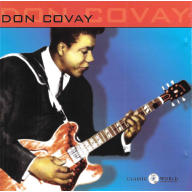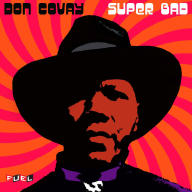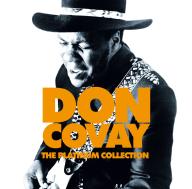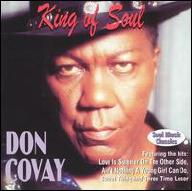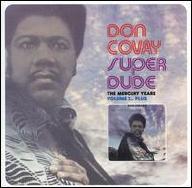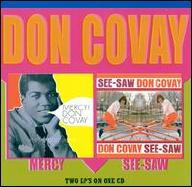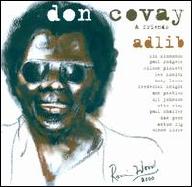Born Donald Randolph in Orangeburg, South Carolina on March 24, 1938, Covay was the son of a Baptist preacher who died when his son was eight. The family soon after relocated to Washington, D.C., where he and his siblings formed a gospel group dubbed the Cherry Keys; while in middle school, however, some of Covay's classmates convinced him to make the leap to secular music, and in 1953 he joined the Rainbows, a local doo wop group that previously enjoyed a national smash with Mary Lee. By the time Covay joined the Rainbows the original lineup had long since splintered, and his recorded debut with the group, 1956's Shirley, was not a hit. He stuck around for one more single, Minnie, before exiting; contrary to legend, this iteration of the Rainbows did not include either a young Marvin Gaye or Billy Stewart, although both fledgling singers did occasionally fill in for absent personnel during live performances.
In the meantime Covay landed a job chauffeuring his idol, Little Richard, doing double-duty as the hitmaker's opening act; Richard soon produced Covay's 1957 solo debut Bip Bip Bip, a blistering single credited to Pretty Boy. Issued on Atlantic, the record went nowhere and he next landed at Sue. During the remaining years of the decade Covay released four more singles for as many labels -- Switchin' in the Kitchen on Big, Standing in the Doorway on Blaze, If You See Mary Lee on Firefly and 'Cause I Love You on Big Top -- none of them hits. He then signed to major label Columbia, issuing three 1961 singles -- Shake Wid the Snake, the Ben E. King-soundalike See About Me, and Now That I Need You -- that showcased the vast eclecticism of his approach, from retro-doo wop to uptown soul to smoldering RB. As his recording career refused to catch fire, Covay increasingly focused on songwriting, partnering with fellow Rainbows alum John Berry to pen a dance tune called Pony Time -- recorded by Covay for the Arnold label with backing band the Goodtimers, the resulting 1961 single proved to be his first chart hit, inching to the number 60 spot on the Billboard pop countdown. Equally significant, Chubby Checker soon after recorded his own version, topping the pop and RB charts in early 1962.
Covay resumed his solo career with 1962's I'm Your Soldier Boy, his lone effort for Scepter; he then signed to Cameo, scoring another minor chart hit with The Popeye Waddle, a novelty record inspired by New Orleans' "Popeye" dance craze. Its 1963 follow-up Wiggle Wobble went nowhere, however, as did Ain't That Silly and The Froog, both cut for Cameo's Parkway subsidiary. At the same time, however, Covay continued an impressive string of songwriting hits, including Jerry Butler's You Can Run (But You Can't Hide), Gladys Knight the Pips' Letter Full of Tears and Connie Francis' Mr. Twister. He also authored I'm Gonna Cry, Wilson Pickett's debut single for Atlantic. Covay next landed at the tiny Rosemart label, where he entered perhaps the most creatively rewarding period of his career -- his first single for the label, 1964's Mercy Mercy, was cut with a then-unknown Jimi Hendrix on guitar, and went on to crack the Billboard Top 40 after Atlantic picked it up for distribution. The song remains an RB classic, and earned even greater notoriety a year later when the Rolling Stones recorded their own rendition for the Out of Our Heads LP; even upon cursory listens, it's impossible not to hear the massive impact of Covay's brash style and bluesy phrasing on Mick Jagger's own frontman persona.
In the meantime, Covay squeaked back into the Hot 100 with Take This Hurt Off Me, graduating to Atlantic on a full-time basis with 1965's The Boomerang. The latter didn't chart at all, but the move to Atlantic gave him access to collaborators including Memphis legends like keyboardist Booker T. Jones and guitarist Steve Cropper, and his music achieved an even more powerfully soulful edge. Please Do Something fell just shy of the RB Top 20, and its follow-up See Saw proved Covay's biggest hit to date, reaching the RB Top Five and coming in at number 44 on the pop charts. By now the likes of Etta James (Watch Dog and I'm Gonna Take What He's Got) and Otis Redding (Think About It and Demonstration) were recording his material, but he could never quite maintain the same momentum as a performer, in 1966 releasing three brilliant Atlantic singles -- Sookie Sookie, You Put Something on Me and Somebody's Got to Love You -- that all failed to chart. The relatively minor Shingaling '67 at least made it as far as the RB Top 50, but both '40 Days-40 Nights" and You've Got Me on Your Critical List sank without a trace. And even though Aretha Franklin scored one of her biggest and most enduring hits in 1968 with Chain of Fools, written by Covay some 15 years earlier, his own recording that same year went nowhere.
Covay attempted to reignite his flagging career by organizing the Soul Clan, a Murderers' Row of RB greats that also included Solomon Burke, Joe Tex, Ben E. King and Arthur Conley. The supergroup's lone Atlantic effort Soul Meeting was a minor pop it, reaching the RB Top 40 in late 1968. After two more failed solo singles, I Stole Some Love and Sweet Pea, Covay teamed with former Shirelles guitarist Joe Richardson and folkie John Hammond in the Jefferson Lemon Blues Band, an odd stab at underground blues-rock that yielded a 1969 LP, The House of Blue Lights and hit number 43 on the RB chart with the single Black Woman. He left Atlantic for Janus in 1970, releasing a second Jefferson Lemon Blues Band LP, Different Strokes for Different Folks, before signing to Mercury in 1972 as an A&R exec. There he also began work on Superdude, the blistering 1973 album that many groove-heads regard as his masterpiece -- the album yielded a pair of hits, the pop smash I Was Checkin' Out While She Was Checkin' In and Somebody's Been Enjoying My Home.
The gospel-inspired non-LP single It's Better to Have (And Don't Need) returned Covay to the charts in 1974, followed a year later by Rumble in the Jungle, a novelty effort inspired by the now-legendary heavyweight bout pairing Muhammad Ali against George Foreman. He then migrated to Philadelphia International, teaming with famed producers Kenny Gamble and Leon Huff for 1976's Travelin' in Heavy Traffic -- neither Right Time for Love nor the title track charted, and apart from two indie records, 1977's U-Von effort Back to the Roots and 1980s Newman release Badd Boy, it seemed Covay's recording career was over. He didn't resurface until 1986, contributing backing vocals to the Rolling Stones' Dirty Work -- in 1993, the Stones' Ron Wood repaid the favor, joining the likes of Iggy Pop and Todd Rundgren for the tribute LP Back to the Streets: Celebrating the Music of Don Covay. That same year, Covay was honored by the Rhythm & Blues Foundation with one of its prestigious Pioneer Awards, but he was unable to attend the awards ceremony due to the lingering effects of a stroke he suffered in 1992. He gradually regained his health, however, and in 2000 issued Ad Lib, his first new studio album in nearly a quarter century. Covay died on January 31, 2015 at the age of 78, after suffering another stroke. ~ Jason Ankeny, Rovi


